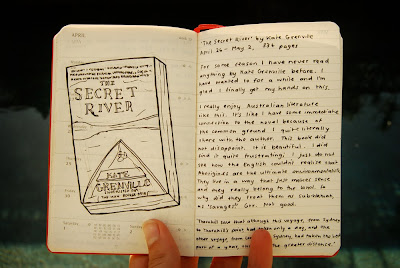'Not Untrue & Not Unkind' by Ed O'Loughlin
May 20 - 23, 276 pages
Any book with an ampersand in its title scores automatic points with me for starters.
Punctuation aside (I do go on about it a lot, just reading the previous entry), I enjoyed this novel. It's a story that is well told. I liked how it didn't stay in one place. And it was intense when it needed to be and calm when it didn't. I felt like I was there with them - either when they were out in the field amidst the African wars, or having a smoke and telling jokes over whisky. Oh, to be a reporter.
I can't believe this is O'Loughlin's first novel. It is a fine work of fiction. A very interesting read. I want more.
This novel was written just as I imagine a reporter would write it. It was very good. I must admit that I was a bit over my head with the politics and wars in Africa, but I got the general gist.
24 May 2010
17 May 2010
WEEK TWENTY - 'THE ROAD' & 'THE TEMPEST'
'The Road' by Cormac McCarthy
May 12 - 13, 287 pages
This book is gripping. Intense. Harrowing. Once I started I found it hard to stop, you just can't look away. I really felt for the two characters, willing them on, wishing them warmth and food. I recommend this novel. It is quite brilliant.
My only objection is the serious lack of apostrophes; it was all 'cant', 'dont' and 'wont' when it came to them. Otherwise, great. 'You forget what you want to remember and remember what you want to forget.'
'The Tempest' by William Shakespeare
May 15 - 16, 87 pages
We both know I could gush about Mr Shakespeare for years. I especially enjoyed the epilogue, asking the audience to 'release' him 'with the help of your good hands.'
Both of these books had me up reading late at night because I just had to finish them. I love it when a book can do that, but I don't appreciate it so much in the morning.
Here are some lines I enjoyed from 'The Tempest':
'A pox o' your throat, you bawling, blasphemous, incharitable dog!' (When it comes to insults, the Bard has undoubtedly the best of them all)
'Your tale, sir, would cure deafness'
'He receives comfort like cold porridge'
'You cram these words into mine ears against / The stomach of mine sense.'
May 12 - 13, 287 pages
This book is gripping. Intense. Harrowing. Once I started I found it hard to stop, you just can't look away. I really felt for the two characters, willing them on, wishing them warmth and food. I recommend this novel. It is quite brilliant.
My only objection is the serious lack of apostrophes; it was all 'cant', 'dont' and 'wont' when it came to them. Otherwise, great. 'You forget what you want to remember and remember what you want to forget.'
'The Tempest' by William Shakespeare
May 15 - 16, 87 pages
We both know I could gush about Mr Shakespeare for years. I especially enjoyed the epilogue, asking the audience to 'release' him 'with the help of your good hands.'
Both of these books had me up reading late at night because I just had to finish them. I love it when a book can do that, but I don't appreciate it so much in the morning.
Here are some lines I enjoyed from 'The Tempest':
'A pox o' your throat, you bawling, blasphemous, incharitable dog!' (When it comes to insults, the Bard has undoubtedly the best of them all)
'Your tale, sir, would cure deafness'
'He receives comfort like cold porridge'
'You cram these words into mine ears against / The stomach of mine sense.'
10 May 2010
WEEK NINETEEN - 'ME CHEETA'
'Me Cheeta' by James Lever
May 5 - 9, 306 pages
So, get this: this is an autobiography of a monkey. Except (not altogether surprisingly) it is not actually written by the monkey, or rather chimpanzee. The chimpanzee is Cheeta, Tarzan's side-kick in the movies.
The idea is cute and the book is certainly well-researched. Sometimes I wondered how Lever could know to write things without actually speaking to a monkey. Impressive ghost-writing.
The book certainly had its moments - I liked his idea of the 'Project,' that humans are tirelessly making the world safer by killing dangerous animals - but it wasn't my favourite. A nice, light read. Funny at times. But maybe I should have researched American movie stars in the 30s before reading.
May 5 - 9, 306 pages
So, get this: this is an autobiography of a monkey. Except (not altogether surprisingly) it is not actually written by the monkey, or rather chimpanzee. The chimpanzee is Cheeta, Tarzan's side-kick in the movies.
The idea is cute and the book is certainly well-researched. Sometimes I wondered how Lever could know to write things without actually speaking to a monkey. Impressive ghost-writing.
The book certainly had its moments - I liked his idea of the 'Project,' that humans are tirelessly making the world safer by killing dangerous animals - but it wasn't my favourite. A nice, light read. Funny at times. But maybe I should have researched American movie stars in the 30s before reading.
03 May 2010
WEEK EIGHTEEN - 'THE SECRET RIVER'
'The Secret River' by Kate Grenville
April 26 - May 2, 334 pages
For some reason I have never read anything by Kate Grenville before. I have wanted to for a while and I'm glad I finally got my hands on this.
I really enjoy Australian literature. It's like I have some immediate connection to the novel because of the common ground I quite literally share with the author. This book did not disappoint. It is beautiful. I did find it quite frustrating; I just do not see how the English couldn't realise that Aborigines are the ultimate environmentalists. They live in a way that just makes sense and they really belong to the land. So why did they treat them as sub-human? As 'savages'? Grr. Not good.
'Thornhill saw that although this voyage, from Sydney to Thornhill's Point, had taken only a day, and the other voyage, from London to Sydney, had taken the best part of a year, this was the greater distance.'
An excellent read.
'Everywhere was the same but everywhere was different.'
April 26 - May 2, 334 pages
For some reason I have never read anything by Kate Grenville before. I have wanted to for a while and I'm glad I finally got my hands on this.
I really enjoy Australian literature. It's like I have some immediate connection to the novel because of the common ground I quite literally share with the author. This book did not disappoint. It is beautiful. I did find it quite frustrating; I just do not see how the English couldn't realise that Aborigines are the ultimate environmentalists. They live in a way that just makes sense and they really belong to the land. So why did they treat them as sub-human? As 'savages'? Grr. Not good.
'Thornhill saw that although this voyage, from Sydney to Thornhill's Point, had taken only a day, and the other voyage, from London to Sydney, had taken the best part of a year, this was the greater distance.'
An excellent read.
'Everywhere was the same but everywhere was different.'
Subscribe to:
Comments (Atom)





